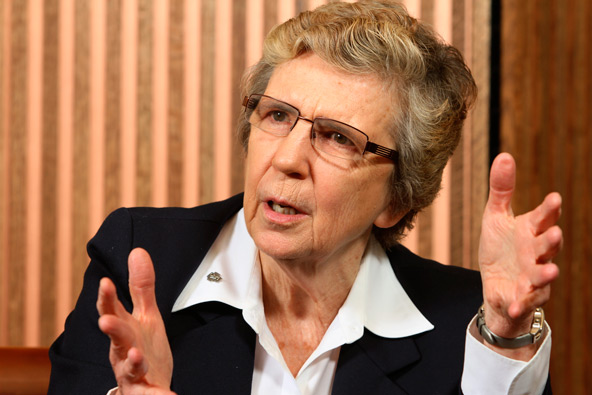
WASHINGTON (CNS) — The Catholic Health Association said it would help its members implement the final rules on women's access to contraceptive coverage set by the federal Department of Health and Human Services using an accommodation as outlined by HHS for religious employers who are morally opposed to providing such coverage but are not exempted.
“Our contribution to the process has been to work for the protection of religious organizations, especially our members,” the CHA said in a press release issued July 9. “We will work with our members to implement this accommodation.”
The CHA noted the finalized rules issued June 28 were not acceptable in their entirety to all who had objected to them, including the U.S. Conference of Catholic Bishops.
“Throughout this process, CHA has been in dialogue with the leadership of the bishops' conference, the (Obama) administration and HHS. We are pleased that our members now have an accommodation that will not require them to contract, provide, pay or refer for contraceptive coverage,” the CHA said.
“We also recognize that this resolution has not been what some organizations, including the bishops' conference, asked for on behalf of a wider group,” it added. “We recognize the broader issues will continue to be debated and litigated by others.”
The CHA had what it said were “two principal concerns” over the original HHS rules issued early in 2012.
“The first was the four-part definition of what constituted a 'religious employer.' That concern has been eliminated,” it said.
“CHA's second concern was establishing a federal precedent that mandated our members would have to include in their health plans, services they had well-established moral objections to. HHS has now established an accommodation that will allow our ministries to continue offering health insurance plans for their employees as they have always done.”
The final rules, issued June 28, update the proposed rules HHS had issued in February and left open for comment through April.
Often referred to as the “contraceptive mandate,” it requires most employers, including religious employers, to provide coverage of contraceptives, sterilization and some abortion-inducing drugs free of charge, even if the employer is morally opposed to such services.
The final rules to implement the mandate include an exemption for some religious employers that fit certain criteria, such as churches, their integrated auxiliaries, and conventions or associations of churches, as well as to the exclusively religious activities of any religious order.
For nonprofit religious organizations — including charities, hospitals and universities — that do not fall under the exemption but are morally opposed to providing the coverage, HHS has stipulated an accommodation: The coverage will be provided separately through health insurance companies or third-party administrators who must ensure that payments for contraceptive services come from outside the objecting organization's premiums.
For self-insuring institutions, a third-party administrator would provide or arrange the services, paid for through reductions in federally facilitated-exchange user fees associated with their health insurance provider.
Cardinal Timothy M. Dolan of New York, USCCB president, said in a July 3 statement that the bishops' conference would not provide a full statement until it completed its analysis of the final rules, which run 110 pages and are “long and complex.” But he said “some basic elements … have already come into focus.”
He expressed concerns about the narrow definition of those “religious employers” exempt from contraceptive coverage requirement; the accommodation of religious ministries excluded from that definition; and the treatment of businesses run by people who seek to operate their companies according to religious principles.
The final rules do not eliminate “the need to continue defending our rights in Congress and the courts,” he said.
On July 2, a group of 58 religious leaders issued an open letter urging the U.S. government to “expand conscience protections” in the contraceptive mandate.
The letter, “Standing Together for Religious Freedom,” said the country's “delicate liberty of conscience is under threat.” The signers called on HHS to provide conscience protections to “any organization or individual that has religious or moral objections to covering, providing or enabling access to the mandated drugs and services.”
Among the signers was Archbishop William E. Lori of Baltimore, chairman of the U.S. bishops' Ad Hoc Committee for Religious Liberty.
The CHA issued a separate overview of the rule to its members.
It said employers can “self-certify” that it satisfies three criteria to be deemed an “eligible organization” for being exempt from the rule's requirements. Those criteria are if the organization is organized and operates as a nonprofit entity; holds itself out as a religious organization; and “opposes providing coverage for some or all of the contraceptive services required to be covered under the ACA on account of religious objections.”
In the case of for-profit organizations, “we had requested the (HHS, Labor and Treasury) Departments to permit all entities — including those that are for-profit — participating in a health plan sponsored by an eligible organization and which are controlled directly or indirectly by such eligible organizations to be covered by the accommodation,” the CHA said in its overview.
“Our request was acknowledged in the preamble to the final rules, but the Departments determined that they would not extend the accommodation to such for-profit entities,” the CHA added. “They did clarify that if you have an objecting nonprofit entity that is 50 percent or more controlled by an eligible organization and which participates in the eligible organization's self-insured plan, that nonprofit entity can be covered by the accommodation even if it does not 'hold itself out' as religious.”






